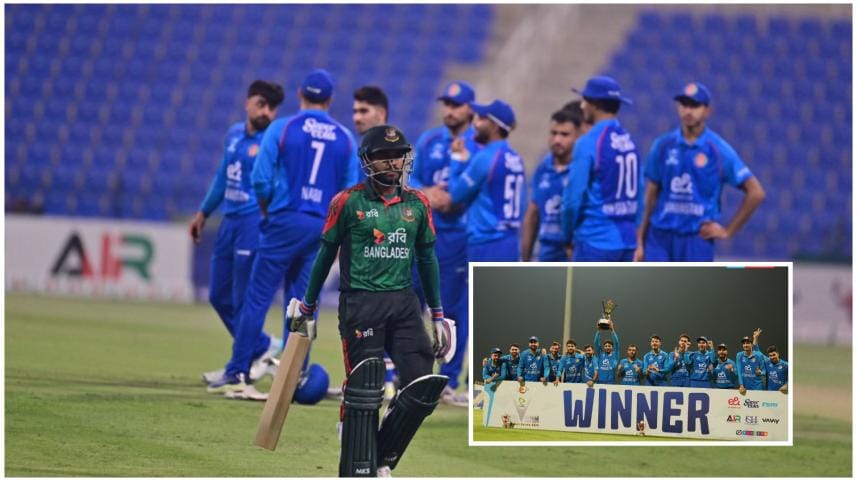Tigers in freefall: Afghanistan rout exposes Bangladesh's ODI crisis

The Tigers' latest humiliation in the 50-over format at the hands of Afghanistan once again reminded everyone how the once strong Bangladesh ODI unit has crumbled.
A 200-run defeat in Abu Dhabi on Tuesday, which sealed a 3-0 whitewash for Afghanistan, should serve as a wake-up call for Bangladesh's cricket administrators and organisers.
The manner of the loss was not just another bad day on the field — it was a glaring warning that the foundations of the country's once-proud ODI structure are crumbling fast.
It is a humbling and painful regression for a nation that once prided itself on its ODI strength. For years, this was the format that defined Bangladesh cricket — the one that gave hope, belief, and identity. From the 1997 ICC Trophy triumph to memorable wins in the 2015 World Cup and a semifinal run in the 2017 Champions Trophy, ODIs were the format through which Bangladesh found their voice on the world stage.
Now, that voice has faded into a murmur. In the last few years, Bangladesh's ODI performance has plummeted, exposing cracks not only in skill and mentality but also in the very foundation of their cricketing structure.
The real problem, as many insiders suggest, begins at home -- with the Dhaka Premier League (DPL). Once the heartbeat of Bangladesh's cricket ecosystem, the DPL was where stars were born and reputations made. It was competitive, fierce, and crucial to the national pipeline. Today, it stands as a hollow shell of its past -- disorganised, uninspired, and lacking purpose.
Afghanistan's rout exposed everything that has gone wrong. After posting 293 for 9, they bundled Bangladesh out for just 93 -- a repeat of the same old script. Poor starts, middle-order collapse, and no resistance. Bangladesh captain Mehidy Hasan Miraz's admission that "batting out 50 overs is now our first priority" reflects the scale of decline.
Chief selector Gazi Ashraf Hossain Lipu's words paint an even bleaker picture of structural rot. "We don't have enough available players. I have to work with what's in my basket," he said, admitting the lack of depth in the system.
"There is only one domestic league for the ODI format. Foreign players don't play there anymore. How many national team players get a chance to play? If we can't increase the 'A' team's matches simultaneously, what can you expect from the team in the 2027 World Cup?"
He didn't hold back when addressing the mindset issue either. "I don't see any solution unless you change your characteristics. If someone could have played like Ibrahim [Zadran], one man, it would have been a different atmosphere. If that thing is not shown, maybe we are blaming number five and six or six and seven, but sometimes number one, two, three just get away with the whole thing. But everybody is considered on the same platform."
Lipu's comments cut through excuses. "Everyone's opportunity is being revealed in a different way in a different place. Now, if number one batted against Rashid [Khan], then it would be understood how much number one understands the googly. Number one couldn't even sustain until Rashid came, but the benefit is gone. There is no point in talking about one, two, three getting out, they are not performing well."
"You always have to think about something else—why am I declining in the ODI format? That needs to be brought to the table first; its post-mortem needs to happen first."
Bangladesh's ODI story once symbolised hope and resilience. Today, it reflects stagnation and neglect. Unless the domestic structure is rebuilt and the mindset shifts, the Tigers risk losing the one format that once made them proud — not just in numbers, but in identity.



 For all latest news, follow The Daily Star's Google News channel.
For all latest news, follow The Daily Star's Google News channel.
Comments